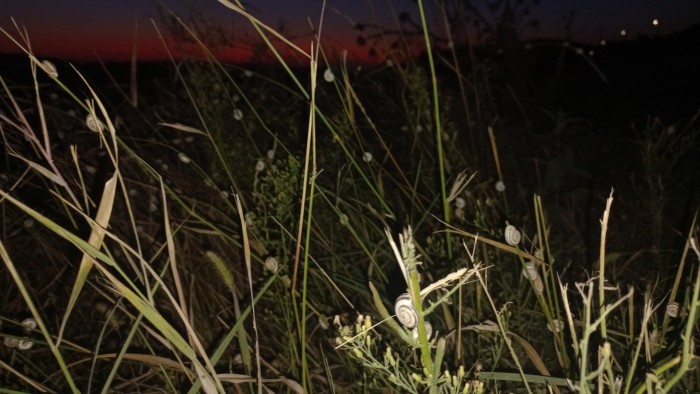Unlock the Editor’s Digest for free
Roula Khalaf, Editor of the FT, selects her favourite stories in this weekly newsletter.
You’d be forgiven for thinking that something disastrous happened when they printed Maria Reva’s debut novel Endling. On page 131, the end credits start rolling, followed by the acknowledgments on page 133, a note on the author on page 135, and a note on the type on page 137. This is a book that is more than 300 pages long.
As much as I love to imagine the moment the publisher realises the major blunder — cue Malcolm Tucker marching in to savagely dismiss the responsible party — there is nothing accidental about this accident whatsoever. Rather, it is the cornerstone to Reva’s carefully constructed metafictional universe, which brazenly ignores the division between reality and fiction.
Endling is many things at once: a heist plot, a tragicomic road novel, a critique of Ukraine’s mail-order bride business, a moving, personal response to war, a commentary on the limits — and exploitations — of fiction. It is about crossing boundaries, territorial, relational, authorial — those we can cross but shouldn’t, and those we can’t but desperately want to.
What is and isn’t real is a question that puzzles both the reader and the novel’s characters, who all seem to be struggling to make sense of what’s unfolding. This unstable conception of reality is in fact stable ground for the Ukrainian-born Canadian writer; in her satirical short-story collection Good Citizens Need Not Fear (2020), occupants of a Soviet tower block are told by the municipality that it doesn’t exist.
Endling is a thrilling ride. Its protagonist Yeva is an eccentric scientist living out of a makeshift trailer-cum-laboratory, whose love of snails is as nerdy as Nabokov’s for butterflies. Her involvement with a mail-order bride company (called “Romeo Meets Yulia”) is not to find a husband but to fund her life’s work; saving rare species of snails in order to breed them for the future. Endlings are the last known individuals of a species and as the plot unfolds, these gentle, slimy creatures become potent metaphors of rescue and hope.

Yeva meets Nastia and her sister Sol, who are planning to kidnap a group of marriage tourists as a publicity stunt to entice their mother, a political activist, out of hiding. They just need a vehicle. Yeva’s snail laboratory on wheels — with its UV lighting and moss-covered terrarium landscape — becomes the perfect, if unlikely, solution. Initially hoping to abduct 12 unsuspecting bachelors, they unwittingly end up with a baker’s dozen. Yeva worries that 13 is a bad omen.
This is where we are before suddenly everything breaks apart. The Russians cross the border. They hear explosions. “Just fireworks. Right?” And the rails of the so-far conventional novel vanish from view, as if the bombs are destroying not only buildings but Endling’s fourth wall. It is here that Reva (the author, the character, the narrator, who knows), intrudes; as if to say: how do you go on writing fiction when such an existential boundary has been crossed? “What right do I have to write about the war from my armchair?” she asks.
Candidly, she investigates her own guilt for crying (and then not crying), reflects on whether it’s worse for people who left than those who stayed, and describes that platitude of trauma “resolving” as an “optimistic bludgeon”. How to carry on when words fail?
But Reva continues on with her story, tender but never mawkish, flitting between her wish for fiction to save the day or resurrect the prewar past, and an acknowledgment that it never can. Nabokov comes to mind again: “That robust reality makes a ghost of the present,” he writes in Speak, Memory. “The mirror brims with brightness; a bumblebee has entered the room and bumps against the ceiling. Everything is as it should be, nothing will ever change, nobody will ever die.” If only literature truly held such life-preserving powers.
But literature has its limits, and Reva both marvels at and rails against her powerlessness. “My awareness of the ridiculousness of the fantasies, of my mortal inability to make them come true, did nothing to stop the fantasies.”
Fiction may be no match for Russian rockets, but it’s persistent, like Yeva’s snails whose alchemy lies in being able to digest the rot and excrete something useful. And like Reva, who is breaking down the molecules of fiction to get at a “broader, truer truth”, through her combination of drama, self-examination and, notably, humour. “To keep from crying, I would laugh,” is an often-quoted lyric from Ukrainian poet Lesya Ukrainka. And a fitting description of Endling’s raison d’être.
Endling by Maria Reva Virago £20/Doubleday $28, 352 pages
Join our online book group on Facebook at FT Books Café and follow FT Weekend on Instagram, Bluesky and X
